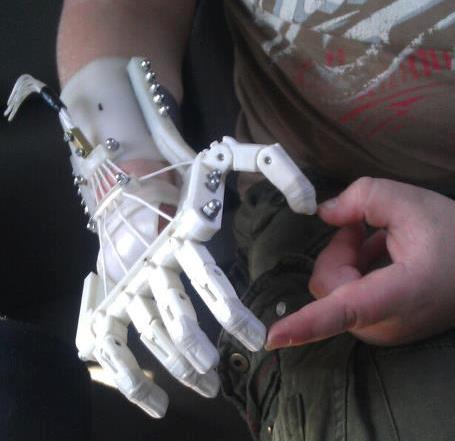Would Medicare Pay for Robohand?
 Leon McCarthy of Marblehead, Massachusetts, was born without fingers on one of his hands. When Leon was 10, his father Paul learned about the Robohand and purchased a 3-D printer to build one for his son.
Leon McCarthy of Marblehead, Massachusetts, was born without fingers on one of his hands. When Leon was 10, his father Paul learned about the Robohand and purchased a 3-D printer to build one for his son.
Although the hand reportedly costs $500 to make, the printer required currently sells for $2,399. Even so, the Robohand is far less expensive than available finger prosthetics. Many of the Robohand’s parts can be reused when new fittings are printed as children grow. Though it not be as functional as some of the much more expensive creations available, people buying their own prosthetics are willing to trade some functionality for the Robohand’s lower cost.
Would Robohand be covered by Medicaid and Medicare? Probably not.
Medicare and Medicaid require a prescription to purchase durable medical equipment like hand prostheses. Leon did not have a prescription. He probably could not have gotten one since the Robohand is not an FDA approved medical device. His father obviously does not meet Medicare requirements for suppliers of custom fabricated and fitted prosthetic devices.
The next time someone argues that deregulation will do nothing to reduce health care costs, keep in mind Medicare and Medicaid durable medical equipment regulations, regulations that both raise costs and act as a competitive deterrent to people who might have ideas for products like the Robohand.


That’s so neat!
We must cut costs without sacrificing quality of care. The government simply can’t seem to do that.
Cuts have to be made, but not in areas that could increase productivity.
Wow. Great story. This is a good reason why consumer driven health care should be at the heart of reform.
“The next time someone argues that deregulation will do nothing to reduce health care costs, keep in mind Medicare and Medicaid durable medical equipment regulations, regulations that both raise costs and act as a competitive deterrent to people who might have ideas for products like the Robohand.”
This really shouldn’t be such a hard thing to understand. We are effectively creating trade barriers. Costs go up, access goes down.
3-D printing is amazing. Given the opportunity to flourish it could drastically reduce the problem of scarcity.
Definitely. My only concern is that the Feds will try to regulate it.
That is a legitimate concern. It’s the only thing they know how to do.
Once again, the federal government is successfully halting innovation.
The lack of the “Robohand” will be the least of the seniors’ problems if the federal government keeps cutting Medicare spending to help fund Obamacare.
Healthcare is changing too fast for a static system. This fee-for-service structure allows so little case-by-case discretion.
This is interesting. I wonder why be bought the 3-D printer instead of just ordering the robohand from someone who already owns the printer and paying for the robohand itself?
I suspect the answer lies in the fact that the printer is not FDA regulated. So, if he buys the printer and prints the robohand without selling the robohand the FDA cannot touch him.
However, if a business owned it and manufactured robohands for sale, it would be FDA regulated.
Some futurists anticipate that 3D printing shops will open up all over, like Kinko’s or Office Depot. In that case, people will be able to come in and print whatever they want.
In that case, the FDA will find it impossible to regulate. (It may not even be legal to regulate, if no interstate commerce occurs.)